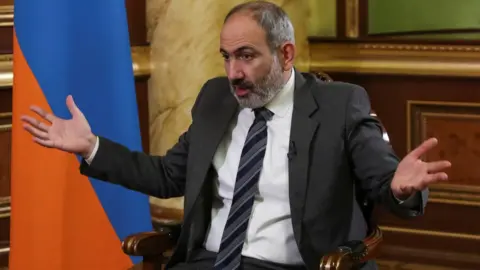Nagorno-Karabakh conflict: Armenian PM admits significant casualties
 Reuters
ReutersArmenian Prime Minister Nikol Pashinyan has admitted that his forces have suffered significant casualties in the battle with Azerbaijan for the disputed territory of Nagorno-Karabakh.
Mr Pashinyan said Armenian forces were still in general control.
Meanwhile, the leaders of Russia and Turkey urged an end to the fighting.
Nagorno-Karabakh is internationally recognised as part of Azerbaijan, but the enclave is controlled by ethnic Armenians.
The latest fighting, which erupted on 27 September, has been the most intense in decades, with hundreds killed so far on both sides.
A ceasefire brokered by Russia was agreed by the two sides last weekend but has not held.
The two countries fought a bloody war over Nagorno-Karabakh in the late 1980s and early 1990s. Although they declared a ceasefire in 1994, they have never managed to agree a peace treaty.
What did Pashinyan say?
In a televised address to the nation on Wednesday, Mr Pashinyan said Armenia had suffered "numerous casualties".
"I bow to all our victims, martyrs, their families, their parents and especially their mothers, and I consider their loss my loss, my personal loss, the loss of my family," he said.
"We all need to know that we are facing a difficult situation," he added.
But Mr Pashinyan said that despite "losses of manpower and equipment", Armenian forces were still in general control and had inflicted "numerous losses of manpower and equipment on the enemy."
"This is not a statement of despair or desperation. I provide this information because I am committed to tell our people the truth," he said.
"We must win, we must live, we must build our history, and we are building our history, our new epic, our new heroic battle".
What else is happening?
The President of Azerbaijan, Ilham Aliyev, accused Armenia on Wednesday of targeting its gas and oil pipelines.
"Armenia is trying to attack and take control of our pipelines," he said in an interview with Turkish broadcaster Haberturk. "If Armenia tries to take control of the pipelines there, I can say that the outcome will be severe for them."
Azerbaijan's defence ministry also said that it had destroyed ballistic missile launchers inside Armenia that were targeting its cities.
Armenian defence ministry spokeswoman Shushan Stepanyan confirmed that positions had been hit but denied that Armenian forces had ever fired "a single missile, shell or projectile" into Azerbaijan, AFP news agency reports.
Russian President Vladimir Putin and Turkish President Recep Tayyip Erdogan spoke on the phone on Wednesday, in their first call since the clashes broke out.
"They stressed the urgent need for joint efforts to end the bloodshed as soon as possible and move to a peaceful settlement of the Nagorno-Karabakh problem," the Kremlin said.

Nagorno-Karabakh - key facts
- A mountainous region of about 4,400 sq km (1,700 sq miles)
- Traditionally inhabited by Christian Armenians and Muslim Turks
- In Soviet times, it became an autonomous region within the republic of Azerbaijan
- Internationally recognised as part of Azerbaijan, but majority of population is ethnic Armenian
- An estimated one million people displaced by war in 1988-1994, and about 30,000 killed
- Separatist forces captured some extra territory around the enclave in Azerbaijan in the 1990s war
- Stalemate has largely prevailed since a 1994 ceasefire
- Turkey openly supports Azerbaijan
- Russia has military bases in Armenia
